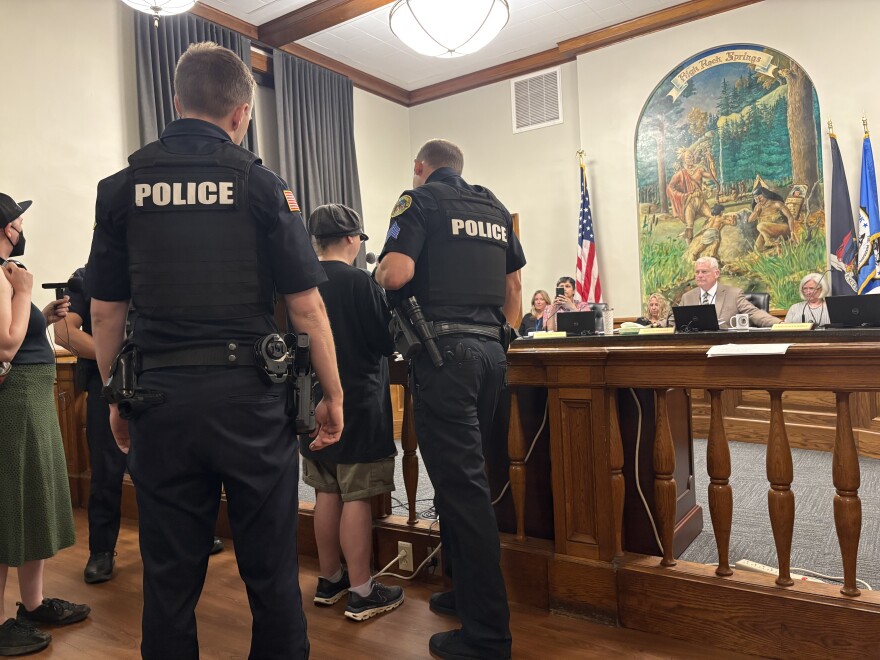Just days before the summer horse racing meet begins, Saratoga Springs officials have passed a controversial camping ban.
The Saratoga Springs City Council held a public hearing on an ordinance titled “camping prohibited on certain public property” for the first and only time Tuesday.
Three dozen residents offered their opinions on the measure with a vast majority speaking in opposition to the change to city codes. At one point, during a lengthy public comment period, city police arrested a local resident who refused to step away from the microphone after speaking for nearly 30 minutes as the council's Republican majority returned after walking out of council chambers.
The new ordinance that passed 3-2 prohibits camping, sitting, or laying in public parking garages and gazebos and on sidewalks, medians, public lots, and easements and outlines prohibited “camping materials” such as tents, mattresses and chairs.
It does not ban camping in parks.
First-term Public Safety Commissioner Tim Coll, a Democrat who won his seat with GOP backing, said the measure was crafted in part to address concerns from local businessowners.
“There’s no criminal penalty. There is a civil penalty that starts at $100. I want to be clear that the ordinance is not—it is addressing the activity of folks, it is going to impact the homeless but it certainly is not targeting the homeless. It’s going to impact panhandlers and it’s also going to impact anyone else who violates the ordinance,” said Coll.
Coll said he envisions violators of the code will get an initial warning from city police before facing a $100 fine, subsequent violations will result in a $250 fine. He said homeless individuals will be referred to the city’s outreach court to connect them with local services.
Heidi Owen-West, vice president of the Downtown Business Association, a local business owner, and a former Republican-endorsed mayoral candidate, was one of a handful of speakers who spoke in favor of the ban.
“This is about creating a downtown that is welcoming to all people: residents, visitors, and businesses alike. Right now, that is not the case. We’re failing our business community. We’re failing our public safety officials. And we’re failing those who are struggling the most. Please give us the chance to try something different. Give our police the tools to make downtown safe again. Show our business community, our workers, and our families that we, too, matter,” said Owen-West.
But those opposed said the ban would criminalize homelessness. Hannah Hurley served on former Mayor Ron Kim's homelessness task force. Two years ago, the talk force provided several potential sites for a permanent, low-barrier shelter but the city has not yet moved on their recommendations.
“When homeless people are saddled with cripplingly high fines and fees for camping or incarcerated for having to live outdoors it hurts their employment and housing options, access to education, family sustainability and communities. This is not an effective way to keep our community safe,” said Hurley.
Some questioned the legality of the camping ban. Melanie Trimble is Regional Director of the New York Civil Liberties Union.
“While Saratoga Springs can regulate, reasonably, where and when camping is permitted on city property, it cannot simply ban it outright. And, in particular, if there are no alternative shelter options. The city’s only temporary shelter option, run by RISE Housing and Support Services, is full with a regular waitlist of Saratoga Springs and Saratoga County residents seeking a bed. More capacity, as promised, is desperately needed,” said Trimble.
As is, the future of the city’s only 24/7, low-barrier shelter, which was originally pitched as a temporary fix, is in question as the city’s commitment to fund the shelter through the end of 2026 is unclear.
Democratic Finance Commissioner Minita Sanghvi, who voted against the measure, accused her conservative colleagues of ignoring the needs of those most vulnerable.
“These are families these are kids these are women who are facing domestic violence issues, rape issues, sexual assault issues, men who are facing sexual assault issues, LGBTQ youth. And then we have the Republican majority and one of the first things they do is criminalize homelessness,” said Sanghvi.
The ban is set to go into effect today.






